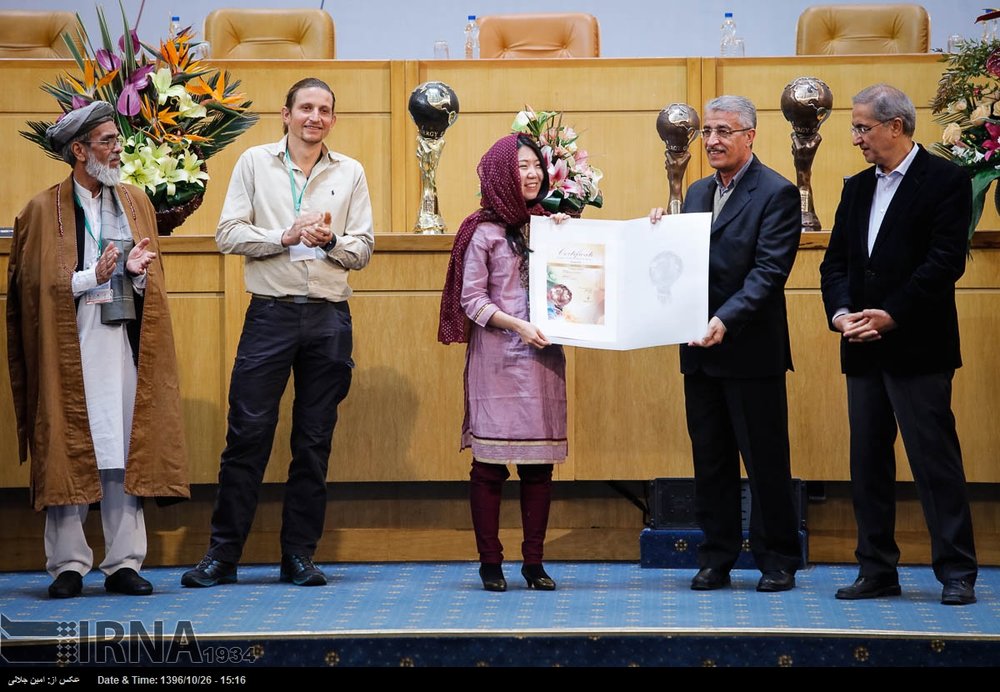Iran wins Energy Globe World Award 2017

TEHRAN — Iran secured the first place in Energy Globe World Awards 2017 in the category of water here on Tuesday.
Iran wins Energy Globe World Award 2017
TEHRAN — Iran secured the first place in Energy Globe World Awards 2017 in the category of water here on Tuesday.
Beating the other two finalists, the Philippines and Singapore, Iran jointly with Sri Lanka won the event’s top prize in the mentioned category.
The Energy Globe Award was founded in 1999 by the Austrian energy pioneer Wolfgang Neumann and is one of today’s most prestigious environmental awards.
Over a ceremony held in Iran International Conference Center in Tehran on Tuesday, upgrade of tailings disposal and water management system project submitted by Kerman Copper Region as well as Puritas Sath Diyawara of Seri Lanka, a project aiming to providing clean drinking water to people affected by chronic kidney disease, came jointly in first.
Projects from Afghanistan, India, Austria, and New Zealand also won the first place in other categories of earth, fire, air, youth respectively. Uganda also became the world winner.
‘Sustainable development closely linked with water, energy sector’
In a statement given over the award ceremony Iranian Energy Minister Reza Ardakanian explained that the ministry is well-aware of the fact that sustainable development is closely linked with water and energy in every aspect.
In a world with limited natural resources which cannot meet the extravagant lifestyle of the human beings and with the constant ecological degradation, focusing on water, soil, air, energy, youth, and waste is not only “fruitful” but “necessary”, the Founding Director of the United Nations University Institute for Integrated Management of Material Fluxes and of Resources noted.
One of the main challenges the mankind is struggling with and is threatening the earth by impacting human lives is climate change which is the product of the [modern, lavish] lifestyle particularly since the industrialization, the coordinator of the UN-Water Task Force on planning and organization of the new Water Decade noted.
The minister went on to say that implementing goals set by international entities, non-profit and non-governmental bodies are positively affecting the current condition.
Speaking on the sustainable development goals (SDGs) set by the United Nations Ardakanian highlighted that ministry of energy is tasked with striving for SDG 2 (end hunger, achieve food security and improved nutrition, and promote sustainable agriculture), SDG 6 (access to safe water and sanitation and sound management of freshwater ecosystems), and SDG 7 (ensure access to affordable, reliable, sustainable and modern energy for all).
Attaining the aforesaid goals highly depend on changing the current lifestyle and efficient use of energies on individual, organizational, national and international level, the minister suggested.
The ministry is seriously following up on policies to increase energy efficiency and decrease the effects of climate change, he concluded.
The award winner Kerman’s water project

Located in a dry area, the Sarcheshmeh mine, in southeastern province of Kerman, has very limited access to surface water. Due to its geographical location and the climate conditions of the region of Kerman, groundwater is the only reliable source.
The yearly volume of recharge is nearly 5.6 billion cubic meters. However, the volume of discharge is at nearly 6.7 billion cubic meters per year. Therefore, their water balance is negative which leads to an alarming decrease of groundwater. The cathode production even increases the amount of water required for the production process. Due to the local conditions, achieving a stable and reliable source of water is very hard.
A water recycling system using modern methods could be the solution. The Integrated Water Master Plan (IWMP) has improved the consumption of fresh water through the new water resources management and a complete cycle of reclaimed water. Another part of this plan includes the evaluation of the environmental impact according to the latest international standards. Knowledge of international consultants is gathered and implemented. For the best use and maximum recycling of the water, dewatering by means of paste thickeners has been deployed.
Energy Globe Award
The objective of the Energy Globe Award is to present successful sustainable projects to a global audience and to demonstrate that for many environmental problems feasible solutions already exist. Projects submitted from over 170 countries take part each year in the awards.
With a global call for participation Energy Globe invites outstanding sustainable best practice projects to participate in the annual competition. From all over the world, some 800 projects and initiatives are submitted annually to compete for the award.
The Energy Globe Award is given to the best projects in 2 categories of national and international. “Shahriar Sewage Project” from West Towns and Townships of Tehran Province Water and Wastewater Company won the 2017 national Energy Globe Award. Within this unique project, contaminated water for around 50,000 people is cleared up and drinking water is produced. The other nominees were the project “Remediation Of Underground Contamination By Means Of Green Biological Approaches” from Pars Petrochemical Co. and the project “North of Kish Wastewater Treatment Plant” from ZYANE Co.
The international Energy Globe Award distinguishes the best projects in the five categories of earth, fire, water, air and youth and the special category Sustainable Plastics.
The international category winners are awarded in a ceremony which is broadcast all over the world and are in the spotlight of international media coverage. International winners divide a prize pool of 10, 000 euros.
Tehran’s sewerage project was nominated for the 16th Energy Globe Award 2015 in category of water, which was also held in Tehran Milad Tower on January 19, 2016. For the industrialized countries Tehran’s sewerage project was selected as an overall winner as a project in which wastewater is recycled, energy is produced, agricultural land is created and emissions are reduced in a single process.
MQ/MG
